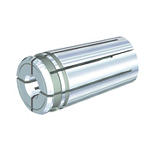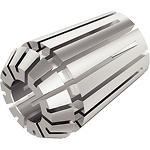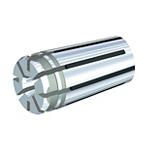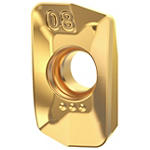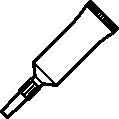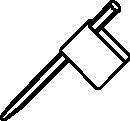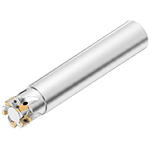Produkt ähnlich wie:
Mill 1-7™ • End Mill • Cylindrical Shank • Metric
Shoulder milling cutter for multiple materials
Material Nummer5190190
ISO Katalog Nummer12A02R018A12ED07ANSI Katalog Nummer12A02R018A12ED07
- P Stahl
- M Rostfreier Stahl
- K Gusseisen
- S Hochwarmfeste Legierungen
- H Gehärtete Werkstoffe
Planfräsen
Spiralförmiges Interpolieren
Schräg-Eintauchfräsen Ins Volle
Nutenfräsen: Ebene Stirnfläche
Umfangfräsen/Schulterfräsen: Ebene Stirnfläche
Zylinderschaft – ohne Spannfläche
Fräsen – Innere Kühlmittelzuführung
Auskammern
Sending to {{cadTool}} in progress...
Downloaded file will be available after import in the {{cadTool}} tool library.
- Überblick
- Anwendungsdaten
- Herunterladen
- Kompatible Teile Maschinenseite
- Kompatible Teile Werkstückseite
- Ersatzteile
- Bewertung
- F&A

| Material Nummer | 5190190 |
| ISO Katalog Nummer | 12A02R018A12ED07 |
| ANSI Katalog Nummer | 12A02R018A12ED07 |
| [D1] Effektiver Schneidendurchmesser | 12 mm |
| [D1] Effektiver Schneidendurchmesser | .467 in |
| [D] Adapter/Schaft/Bohrungsdurchmesser | 12 mm |
| [D] Adapter/Schaft/Bohrungsdurchmesser | .47 in |
| [L] Gesamtlänge | 100 mm |
| [L] Gesamtlänge | 3.937 in |
| [L2] Kopflänge | 18 mm |
| [L2] Kopflänge | .709 in |
| [AP1MAX] 1. maximale Schnitttiefe | 6.96 mm |
| [AP1MAX] 1. maximale Schnitttiefe | .274 in |
| Anzahl der Schneidkörper | 2 |
| Maximaler Eintauchwinkel | 5.18 |
| Gewicht Kilogramm | 0.08 |
| Max. Drehzahl | 64510 |
Werkstoffe
- Stahl
- Rostfreier Stahl
- Gusseisen
- Hochwarmfeste Legierungen
- Gehärtete Werkstoffe
Uses and application
Planfräsen
Spiralförmiges Interpolieren
Schräg-Eintauchfräsen Ins Volle
Nutenfräsen: Ebene Stirnfläche
Umfangfräsen/Schulterfräsen: Ebene Stirnfläche
Zylinderschaft – ohne Spannfläche
Fräsen – Innere Kühlmittelzuführung
Auskammern
Features and benefits
- Internal coolant supply.
- For ramping, slotting, plunging, facing, and true 90° walls.
Lösung erstellen, um Vorschübe und Geschwindigkeiten zu berechnen
Nachdem Sie eine Lösung erstellt haben, wählen Sie einfach das Symbol für Vorschübe und Geschwindigkeiten und unser System gibt Ihnen Empfehlungen. Sie können die Informationen anpassen, indem Sie Ihre Maschine und Spezifikationen hinzufügen oder Anpassungen mithilfe der Schieberegler vornehmen.
Insert Selection
Auswahlhilfe für Wendeschneidplatten
| Werkstoffgruppe | Leichte Bearbeitung | Allgemeine Anwendung | Schruppbearbeitung | |||
| – | (Leicht schneidende Geometrie) | – | (Stabile Geometrie) | |||
| – | Verschleiß- festigkeit |  | Zähigkeit | |||
| – | Geometrie | Sorte | Geometrie | Sorte | Geometrie | Sorte |
| P1–P2 | .S..GE | KC725M | .S..GE | KCPK30 | .S..GE | KCPM40 |
| P3–P4 | .S..GE | KC725M | .S..GE | KCPK30 | .S..GE | KCPM40 |
| P5–P6 | .S..GE | KC725M | .S..GE | KCPK30 | .S..GE | KCPM40 |
| M1–M2 | .S..GE | KC522M | .S..GE | KC725M | .S..GE | KCPM40 |
| M3 | .S..GE | KC725M | .S..GE | KCPK30 | .S..GE | KCPM40 |
| K1–K2 | .S..GE | KCPK30 | .S..GE | KCPK30 | .S..GE | KCPK30 |
| K3 | .S..GE | KCPK30 | .S..GE | KCPK30 | .S..GE | KCPK30 |
| N1–N2 | – | – | – | – | – | – |
| N3 | – | – | – | – | – | – |
| S1–S2 | .S..GE | KC522M | .S..GE | KC725M | .S..GE | KC725M |
| S3 | .S..GE | KC725M | .S..GE | KC725M | .S..GE | KCPM40 |
| S4 | .S..GE | KC522M | .S..GE | KC725M | .S..GE | KC725M |
| H1 | – | – | – | – | – | – |
Feeds
Empfohlene Startwerte für Vorschübe [mm]
| Mill 1-7™ • Recommended Starting Feeds [mm/th] | |||||||||||||||
| Schneidkörper- Geometrie | Empfohlener Start-Vorschub pro Zahn (fz) im Verhältnis zur radialen Schnitttiefe (ae) in % | ||||||||||||||
| 5% | 10% | 20% | 30% | 40–100% | |||||||||||
| L | M | H | L | M | H | L | M | H | L | M | H | L | M | H | |
| .S..GE | 0,23 | 0,47 | 0,69 | 0,17 | 0,34 | 0,50 | 0,13 | 0,26 | 0,37 | 0,11 | 0,22 | 0,32 | 0,10 | 0,20 | 0,30 |
| L = Light Machining; M = Medium Machining; H = Heavy Machining NOTE: Use Light Machining values as starting feed rate. | |||||||||||||||
Recommended Starting Feeds [IPT]
| Mill 1-7™ • Recommended Starting Feeds [IPT] | |||||||||||||||
| Schneidkörper- Geometrie | Empfohlener Start-Vorschub pro Zahn (fz) im Verhältnis zur radialen Schnitttiefe (ae) in % | ||||||||||||||
| 5% | 10% | 20% | 30% | 40–100% | |||||||||||
| L | M | H | L | M | H | L | M | H | L | M | H | L | M | H | |
| .S..GE | 0.009 | 0.018 | 0.027 | 0.007 | 0.013 | 0.019 | 0.005 | 0.010 | 0.014 | 0.004 | 0.009 | 0.013 | 0.004 | 0.008 | 0.012 |
| L = Light Machining; M = Medium Machining; H = Heavy Machining NOTE: Use Light Machining values as starting feed rate. | |||||||||||||||
Speeds
Empfohlene Startwerte für Schnittgeschwindigkeiten [m/min]
| Mill 1-7™ • Recommended Starting Speed [m/min] | ||||||||||||||||
| Schneidstoffsorte | KC522M | KC725M | KCPK30 | KCPM40 | KCSM30 | |||||||||||
| Spandicke hex mm | Min. | Max. | Min. | Max. | Min. | Max. | Min. | Max. | Min. | Max. | ||||||
| Werkstoffgruppe | Max. | Startwert | Min. | Max. | Startwert | Min. | Max. | Startwert | Min. | Max. | Startwert | Min. | Max. | Startwert | Min. | |
| P | 1 | 330 | 285 | 270 | 260 | 230 | 215 | 455 | 395 | 370 | 295 | 260 | 245 | 370 | 320 | 300 |
| 2 | 275 | 240 | 200 | 220 | 190 | 160 | 280 | 255 | 230 | 250 | 215 | 180 | 305 | 270 | 220 | |
| 3 | 255 | 215 | 175 | 200 | 170 | 140 | 255 | 230 | 205 | 230 | 195 | 160 | 285 | 240 | 195 | |
| 4 | 225 | 185 | 150 | 180 | 150 | 120 | 225 | 185 | 160 | 205 | 170 | 135 | 250 | 205 | 165 | |
| 5 | 185 | 170 | 150 | 150 | 135 | 120 | 190 | 170 | 150 | 170 | 155 | 135 | 205 | 190 | 165 | |
| 6 | 165 | 125 | 100 | 130 | 100 | 80 | 160 | 135 | 110 | 150 | 115 | 90 | 185 | 140 | 110 | |
| M | 1 | 205 | 180 | 165 | 170 | 150 | 135 | 205 | 185 | 155 | 195 | 170 | 155 | 225 | 180 | 170 |
| 2 | 185 | 160 | 130 | 155 | 130 | 110 | 185 | 160 | 140 | 175 | 150 | 125 | 205 | 160 | 135 | |
| 3 | 140 | 120 | 95 | 115 | 100 | 80 | 145 | 130 | 115 | 130 | 115 | 90 | 155 | 125 | 95 | |
| K | 1 | 230 | 205 | 185 | – | – | – | 295 | 265 | 240 | – | – | – | – | – | – |
| 2 | 180 | 160 | 150 | – | – | – | 235 | 210 | 190 | – | – | – | – | – | – | |
| 3 | 150 | 135 | 120 | – | – | – | 195 | 175 | 160 | – | – | – | – | – | – | |
| N | 1 | – | – | – | – | – | – | – | – | – | – | – | – | – | – | – |
| 2 | – | – | – | – | – | – | – | – | – | – | – | – | – | – | – | |
| 3 | – | – | – | – | – | – | – | – | – | – | – | – | – | – | – | |
| S | 1 | 40 | 35 | 25 | 35 | 30 | 25 | – | – | – | 40 | 35 | 30 | 45 | 40 | 30 |
| 2 | 40 | 35 | 25 | 35 | 30 | 25 | – | – | – | 40 | 35 | 30 | 45 | 40 | 30 | |
| 3 | 50 | 40 | 25 | 45 | 35 | 25 | – | – | – | 50 | 40 | 30 | 55 | 45 | 30 | |
| 4 | 50 | 45 | 35 | 50 | 45 | 30 | 50 | 45 | 35 | 55 | 50 | 35 | 60 | 55 | 40 | |
| H | 1 | 120 | 90 | 70 | – | – | – | – | – | – | – | – | – | 135 | 100 | 75 |
| As the average chip thickness increases, speed should be decreased. Material groups P, M, K and H show recommended starting speeds for dry machining. For wet machining, reduce speed by 20%. Material groups N and S show recommended starting speeds for wet machining. Not recommended for dry machining. | ||||||||||||||||
| Mill 1-7™ • Recommended Starting Speed [SFM] | ||||||||||||||||
| Schneidstoffsorte | KC522M | KC725M | KCPK30 | KCPM40 | KCSM30 | |||||||||||
| Chip Thickness hex Inch | Min. | Max. | Min. | Max. | Min. | Max. | Min. | Max. | Min. | Max. | ||||||
| Werkstoffgruppe | Max. | Startwert | Min. | Max. | Startwert | Min. | Max. | Startwert | Min. | Max. | Startwert | Min. | Max. | Startwert | Min. | |
| P | 1 | 1085 | 935 | 885 | 855 | 755 | 705 | 1495 | 1295 | 1215 | 970 | 855 | 805 | 1215 | 1050 | 985 |
| 2 | 900 | 785 | 655 | 720 | 625 | 525 | 920 | 835 | 755 | 820 | 705 | 590 | 1000 | 885 | 720 | |
| 3 | 835 | 705 | 575 | 655 | 560 | 460 | 835 | 755 | 675 | 755 | 640 | 525 | 935 | 785 | 640 | |
| 4 | 740 | 605 | 490 | 590 | 490 | 395 | 740 | 605 | 525 | 675 | 560 | 445 | 820 | 675 | 540 | |
| 5 | 605 | 560 | 490 | 490 | 445 | 395 | 625 | 560 | 490 | 560 | 510 | 445 | 675 | 625 | 540 | |
| 6 | 540 | 410 | 330 | 425 | 330 | 260 | 525 | 445 | 360 | 490 | 375 | 295 | 605 | 460 | 360 | |
| M | 1 | 675 | 590 | 540 | 560 | 490 | 445 | 675 | 605 | 510 | 640 | 560 | 510 | 740 | 590 | 560 |
| 2 | 605 | 525 | 425 | 510 | 425 | 360 | 605 | 525 | 460 | 575 | 490 | 410 | 675 | 525 | 445 | |
| 3 | 460 | 395 | 310 | 375 | 330 | 260 | 475 | 425 | 375 | 425 | 375 | 295 | 510 | 410 | 310 | |
| K | 1 | 755 | 675 | 605 | – | – | – | 970 | 870 | 785 | – | – | – | – | – | – |
| 2 | 590 | 525 | 490 | – | – | – | 770 | 690 | 625 | – | – | – | – | – | – | |
| 3 | 490 | 445 | 395 | – | – | – | 640 | 575 | 525 | – | – | – | – | – | – | |
| N | 1 | – | – | – | – | – | – | – | – | – | – | – | – | – | – | – |
| 2 | – | – | – | – | – | – | – | – | – | – | – | – | – | – | – | |
| 3 | – | – | – | – | – | – | – | – | – | – | – | – | – | – | – | |
| S | 1 | 130 | 115 | 80 | 115 | 100 | 80 | – | – | – | 130 | 115 | 100 | 150 | 130 | 100 |
| 2 | 130 | 115 | 80 | 115 | 100 | 80 | – | – | – | 130 | 115 | 100 | 150 | 130 | 100 | |
| 3 | 165 | 130 | 80 | 150 | 115 | 80 | – | – | – | 165 | 130 | 100 | 180 | 150 | 100 | |
| 4 | 165 | 150 | 115 | 165 | 150 | 100 | 165 | 150 | 115 | 180 | 165 | 115 | 195 | 180 | 130 | |
| H | 1 | 395 | 295 | 230 | – | – | – | – | – | – | – | – | – | 445 | 330 | 245 |
| As the average chip thickness increases, speed should be decreased. Material groups P, M, K and H show recommended starting speeds for dry machining. For wet machining, reduce speed by 20%. Material groups N and S show recommended starting speeds for wet machining. Not recommended for dry machining. | ||||||||||||||||
Anwendungsdaten
Anwendungsbeispiele
| Mill 1-7™ • Ramping Angles [mm] | ||||
| Nenn- durch- messer | max. Schräg-Eintauchwinkel wegen Wendeschneidplatte | DH min (min Bohrungsdurchmesser) | DHI min (max. Flachbohrungs-Durchmesser) | max. Bohrungsdurchmesser (keine Flachbohrung) |
| 12 | 5,49° | 14,62 | 21,43 | 24 |
| 16 | 2,92° | 22,52 | 28,04 | 32 |
| 20 | 2,01° | 30,51 | 36,49 | 40 |
Application Examples
| Mill 1-7™ • Ramping Angles [Inch] | ||||
| Nenn- durch- messer | max. Schräg-Eintauchwinkel wegen Wendeschneidplatte | DH min (min Bohrungsdurchmesser) | DHI min (max. Flachbohrungs-Durchmesser) | max. Bohrungsdurchmesser (keine Flachbohrung) |
| Mill-1, 10mm | 0.758 | 1.121 | 1.250 | |
| Mill-1, 10mm | 0.998 | 1.367 | 1.500 | |
| Mill-1, 10mm | 1.248 | 1.617 | 1.750 | |
CAD Drawings Models
Can’t find the file type you’re looking for?
Product data
I have read and accepted the Terms & Conditions of use

